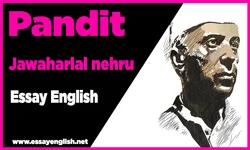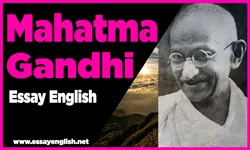Descriptive लेबल असलेली पोस्ट दाखवित आहे. सर्व पोस्ट्स दर्शवा
Descriptive लेबल असलेली पोस्ट दाखवित आहे. सर्व पोस्ट्स दर्शवा
my school essay
The name of my school is I.M.S. High School. It is situated in Shaniwar peth. It is in the heart of the city. The building of my school is very grand. It is a construction of black stone. It has a clock tower, which one can see from very far. There are thirty-five rooms. Classes of standard five to ten are held in them. They are airy and spacious. There is a large playground. There are many kinds of plants and trees. around it. We celebrate our annual social gathering there.
There is a big library and a reading hall. Many books and magazines on various subjects are there. Students go there and read the books of their own interest. The science laboratory in my school is big and well equipped.
 |
| my-school-essay |
All the teachers in my school are well qualified. They are kind and loving. They teach as well. Our principal is a kind-hearted gentleman. He never punishes any student. He encourages the students to study and play as well.
There is a big assembly hall. The debate competitions and
other activities are held there. My school is famous for its good standard of education. I love my school and I am proud of It.
essay on pandit jawaharlal nehru
Essay 1
Jawaharlal Nehru was born on 14th November, 1889. His father Motilal Nehru was a leading lawyer in Allahabad. His mother's name was Swarup Rani. Born after 11 Years of their marriage, Jawaharlal Nehru grew up in opulence. He was the only son in the family with two more siblings Vijayalaxmi and Kirishna.
A home tutor was appointed for the education of Jawaharlal Nehru & his two sister. But when this was found insufficient, he was admitted at the age of 15 to Harrow in England. He had an encyclopedic mind and as such his interests in reading had a wide range. At 17, he joined the Trinity college, Concbridge in October 1907.
 |
| essay-on-pandit-jawaharlal-nehru |
During his stay in England, he was highly interested in the political developments taking place in India. At that time his thoughts were aligned to the extremist ideology spearheaded by Lokamanya Tilak and Arbindo Ghosh, before returning to India in 1912. He also had a short stint at the wonder school of Economics.
Jawaharlal Nehru started practicing law in the Allahabad High Court as his father's deputy. Soon he joined the Congress Party. He met Gandhiji at the Lucknow session in 1916 and was very much impressed by the great personality. He gave up all the comforts of his life and career to become a full-time congress activist. After the incidents like passing of the Rowlatt Bills by the British Govt. and the Jallianwala Bagh Massacre.
Gradually, he rose in command within the congress and became a very important leader. He participated in almost all the movements initiated by the congress and had for India's freedom. He had to go to jail many times and this had a telling effect on his life. He started leading an austere life and development a more radical outlook.
After the independence of India, he became the first Prime Minister of India and continued being the Prime Minister for the next fifteen years. In those days, India had to depend largely on foreign countries for almost all its needs. The agricultural output was low as the farmers used old techniques. The employment
opportunities were low. India depended heavily on the collage industries, which too were very old and practiced old methods. Many of them were running in losses. Jawaharlal Nehru's vision & his great political will was solely responsible for bringing India out of such a deep crisis. The govt. established many agricultural research centers and universities for bringing in modern way of cultivating to make India self-sufficient and many industries provided modern tools. This agricultural development slowly led to the all-round development of India.
Nehru also wanted development for the youth and to create a strong, self-sufficient, modern and a prosperous India. For this, he planned industrial revolution in India. Many Industries were established in India during that time, enabling India to boost its foreign. Thus, he put India on the path of development.
Through out his life, he served the country and was always ready to sacrifice for his country.He is great fond of children. He spend his free time with children. Therefore his birthday is celebrated as a "Children Day". He will be remembered by all the Indians for his statesmanship & great patriotism as long as the world exists.
Essay 2
essay on jawaharlal nehru
JAWAHARLAL NEHRU - The Architect of the Modern India
Jawaharlal Nehru is called the greatest planner and designer of Modern India, as he was the first Prime Minister of India, who gave a shape to his Motherland, with his imaginative mind. He sacrificed his entire life to attain freedom for his country.
He attained popularity all over the world because of his inner virtues and pleasant personality.
This great leader was born at Allahabad on November 14, 1889 in a very affluent Kashmiri family. His father, Motilal Nehru was a reknowned lawyer, and had a flourishing practice in Allahabad.
Nehru was given primary education at his home.
His parents sent him to England to pursue his higher studies when he reached the age of sixteen. He got educated in Cambridge University in England. Thereafter he studied law and returned to India as a full-fledged lawyer.
He began his practice as a lawyer in Allahabad High Court. Initially, he started this work enthusiastically but later on he began to hate the profession, when he came to know that the lawyer's profession is in fact the liar's profession, as the lawyer has to speak lies most of the time.
In the year 1916, he got married to beautiful damsel called Kamla Kaul.
They were leading a blissful married life, until a tragedy befell on them. In 1924, Kamla Nehru got struck with a serious ailment. Jawaharlal Nehru sent her abroad for further treatment.
But inspite of getting the best treatment, she was not able to recover from her illness and thus finally died on February 29, 1936 in Switzerland.
Her death came as a big blow on the Nehru family. Nehru was deeply grieved with her death, but inspite of the bad circumstances he rose up again to serve his countrymen.
He gave up the profession of the lawyer and joined Mahatma Gandhi in his ‘Non-Co-operation Movement'. He was sent to prison numerous times when he fought for the freedom of his country. Yet, he didn't accept defeat in his life.
He carried on with his efforts to gain freedom for his country. Finally, India achieved freedom on 15th August 1947 and Jawaharlal Nehru became the first Prime Minister of India.
Jawaharlal Nehru extended his hands with leaders of all the neighbourly countries of the world including China. But he was shattered when the leaders of China betrayed his trust, by attacking India in the year 1962. Jawaharlal Nehru got another blow when ave the partition of India took place, inspite of his best efforts to save the country from getting divided into two parts.
Nehru was a man of pleasant personality, otherwise, as he remained in cheering spirits most of the time, but the betrayal of the neighborly country “China” made him sad. Nehru died on May 27, 1964. The entire nation mourned his death. Nehru was a selfless and an impartial person. He wanted to give justice to all people irrespective of any caste, colour, creed or race.
He was a prolific writer. His book “Discovery of India' is still read and appreciated by the readers spread worldwide. Nehru was a treasure of virtues like selflessness, sincerity, loyalty and large-heartedness. He had abundant love for the people of his nation. he shall be always remembered for his great contribution as an architect of free India.
essay on my pet dog
Essay 1
I have a pet dog. Its name is Caesar. It is a very handsome dog. I brought it home when it was a small pup. I look after it lovingly. It has sharp teeth and a long tongue. It has a black and white coat of hair. It loves me greatly.
I too love it very much. It obeys my orders. It goes out for a walk with me in the morning and evening. It drinks milk. It likes meat, biscuits and bread. Caesar is a faithful dog. It guards our house. It barks when it sees a stranger. My friends and I play with Caesar.
 |
| essay-on-my-pet-dog |
my pet dog essay for class 4
Essay 2
I have a dog. His name is Tipu. He is brown in colour. He has four legs and a tail. He is strong.
Tipu eats bread and chapati. He likes milk. He plays a ball with me. I throw it and Tipu brings it back in his mouth. I pat him. He licks my hand.
He guards our house. He barks at the strangers. He is very obedient and faithful.
Essay 3
I had heard that of all the animals that were housepets, the horse, cow and dog were the most faithful. In fact, my grandmother always said that if you fed a dog once, he would never leave your door and would protect you always.
Keeping all this in mind, I asked my parents if I could keep a dog as a pet. My mother objected strongly saying that I would lose interest in the dog within a short time and all the responsibility would fall on her shoulders. I promised them both, that I would do everything to take care of my pet.
We drove to 'Friendicos', an NGO that took care of stray dogs. My father was very clear in his mind that if we kept a dog, it would have to be a dog from the street, the idea was to give a home to a stray animal There were several dogs there, some being treated by the 'vet' as they were ill and discarded. I was surprised to see some dogs in cages, and I was told that they were undergoing treatment and had to be separated from the rest.
I fell in love with a black, female dog. She was only a puppy. Within a few minutes, the formalities were complete and we drove home with my new companion.
My whole life has changed. I have learnt to love and care and my dog taught me this great lesson.
Essay on mahatma gandhi
Essay no 1 600 words
MAHATMA GANDHI The greatest freedom fighter of the Nation Don't hear evil, Don't see evil, Don't speak evil. Mahatma Gandhi Mahatma Gandhi was one of the greatest leaders of the world, who fought for independence peacefully and attained freedom for his country. He not only gained freedom for his own country but also prompted other world leaders to fight for freedom peacefully.
Mahatma Gandhi's full name was Mohandas Karamchand Gandhi. Mohandas was born on 2nd October 1869 in Porbandar. Mohandas was a naughty child. He liked to play pranks. One day, he stole away the money of his father from his purse, but later on repented for his mistake, when his father scolded him for doing wrong. Mahatma Gandhi felt guilty for his mistake and promised that he would never repeat it again in his life.
Mahatma Gandhi's full name was Mohandas Karamchand Gandhi. Mohandas was born on 2nd October 1869 in Porbandar. Mohandas was a naughty child. He liked to play pranks. One day, he stole away the money of his father from his purse, but later on repented for his mistake, when his father scolded him for doing wrong. Mahatma Gandhi felt guilty for his mistake and promised that he would never repeat it again in his life.
 |
| essay-on-mahatma-gandhi |
Mohandas was as human like all of us. He also did mistakes. But virtue that made him superior to all of us was, that he rectified his mistakes and never repeated them again in his life. Mohandas passed his Matriculation exam from Rajkot and thereafter joined Samaldas College in Bhavnagar. He went to study Law in England and returned back as a Barrister after 3 years.
He began to practice law in Bombay but could not attain success in it because he fought for truth and very rare cases were picked up by him, as he only selected the true cases and rejected the false ones. Therefore, very few cases were fought by him. In the year 1913, he went to South Africa to plead the case of a company called Dada Abdullah and Co.
In Africa he was travelling by a train, when a white threw him out of the train as the belonged to the black race. At that time apartheid was on its peak in S. Africa. Mohandas was deeply hurt with this incident. He was shocked at the cruel behaviour of the whites, who discriminated between caste, colour and creed and had no mercy at the plight of innocent people.
Mahatma Gandhi took a pledge to revolt against the wrongs done by the Whites. In South Africa, Mahatma Gandhi fought for the rights of Indians and began a ‘Satyagraha’ movement to improve their condition.
The Racialist regime of South Africa had to bow its head before him and thus ‘The Indian Relief Act' was passed in favour of the Indians settled there. In the year 1915 Gandhi came back to India and joined the Indian National Congress.
In 1924, he got elected as the President of Indian National Congress. He began the Non-Co-operation Movement in 1930 to protest against the atrocities done by the British through peaceful ways. In 1930 he began the Civil Disobedience Movement. The Quit India Movement was started by him in the year 1942.
He had to endure the tyrannies of the cruel britishers but he tolerated all their atrocities with a hope for a better tomorrow. He was hopeful that one day the Britishers would have to run away from his nation and thus the nation shall get freedom from their entangles. Finally, Mahatma Gandhi's all dreams took a practical shape. India attained freedom on 15th August 1947.
But a section of people was not happy with his policies. A person called Nathuram Godse could not digest Mahatma Gandhi's popularity. He shot him dead on January 30, 1948, in a prayer assembly at Birla house, Delhi. The lover of mankind left his beloved nation bereaved at his loss.
Numerous people come and go from this earth, but a person like Mahatma Gandhi leaves a mark that can never be erased.
Mahatma gandhi essay in english
Essay no 2 800 words
Mahatma Gandhi By elevating Gandhi as 'Father of the Nation', the people of India have already accepted the pre-eminent role which he played in transforming our ancient society into a modern nation. Besides fighting successfully the battle of freedom the moral way, he devised important principles for the upliftment of our caste-ridden unequal society to an egalitarian and simple society with ideals of self-sufficiency in every walk of life.
His principles of thought and action do hold the promise of guiding us in the future by seeking to carry out social, political and moral experiments of his choice, which alone could create solutions of the anguish and dilemmas of the people.
Before we focus our gaze on such issues, it is necessary to say a few words about what the phrase the “Father of the Nation” really signifies- In the long history of the civilization of India, the 20th century stood for the Indian people as a century of freedom, and dramatic and qualitative transformation in social, economic and political domains.
The question of political liberty, of freedom from British domination, was simply one aspect of this complex and multifaceted phenomena. No less significant were the other integrally associated changes in the social, economic and moral domains.
Equally relevant to the issue is the fact that in the course of his societal experimentation, The moral logic and the spatial trajectory of his politics, therefore, has to be understood in relationship with the total transformation which he sought to negotiate within the lifestream of the Indian nation.
At the outset, Gandhi was able to offer to the people of the country as well to the British, the suppressors of the people, a satisfactory answer to the question of India's identity as a modern nation, and her viability as a liberal and democratic polity. For the British, as in the role of Gandhi's political adversaries, questioned the very notion of India as a liberal polity and a viable nation.
The sub-continent of India, according to the British, was inhabited by an amorphous civilisation constituted, in most of its long history, of factions and warring states and at the same time, as the civilisation of India was composed of a profoundly unequal and hierarchical society, highly unsuitable as the base of a liberal polity. But by drawing upon a saintly idiom of militant nonviolence, which Gandhi's Satyagraha was, the Mahatma organised one of the most substantial mass movements in world history in the 20th century, to portray the strategic cohesion of Indian society.
Before the arrival of Gandhi from South Africa Indian Freedom movement was just like any other freedom movements which were happening in the other countries of the world or had taken place during the French and American revolutions Mahatma Gandhi gave a unique character to Indian. Freedom movement.
His political philosophy of truth and non-violence just goes unparalleled in the history of the world. He emphasised on the involvement of masses in the 'Struggle for Independence'. According to him, individual efforts may lead to partial or no success. And the use of violence will only strengthen the opponent, Britishers, They next time, they will retort more strongly. It is through truth, non-violence, love, persuasion we will be able to change their hearts.
He had organised three mass movements Civil Disobedience, non-co-operation, and Quit India- which shook the British Empire. Such had been the impact of Mahatma in the Indian Freedom movement that after his arrival from South Africa the whole freedom movement of India revolved round him.
Small wonder then that while the common folk of India looked upon the Mahatma as the “Father of the nation", the world as a whole regarded him as the greatest theorist and practitioner of nonviolence in the 20th century.
Gandhi's definition of the collective identity of Indian society as an entity shaped through the creative interplay of different constituents of a uniquely plural social order is something which needs to be highlighted in the context of social turbulence of our times. This is so because of the challenge posed by an alternative definition of an overarching identity of Indian nation, which puts the moral and cultural world of nationalism above that of all the religious systems of India.
Any step towards undoing the sacred contract which drew different communities into cohesive nationhood would have paved the way for the dissolution of the national unity of India. And such a step eventually brought the partition of the country.
Besides seeking to resolve the vexed question of the collective identity of a society as diverse as Indian society, Gandhi also reflected and experimented upon the matter in which production and distribution of wealth could best be organized within India for the collective good of the people.
More than half a century after his death, Mahatma Gandhi remains, as always, the symbol of individual courage and righteousness, against the forces of the state. His example inspired Martin Luther King and black Americans to organize the civil rights campaign of the 1960s. At a later date Nelson Mandela testified to have come under the same influence. Having slid down the moral scale of human values and finding corruption rampant in society around, he said, “We need to pay more heed to the basic principles of Gandhian philosophy if we are to come out of this quagmire.”
Short essay on mahatma gandhi
Essay no 3 100 words
Mahatma Gandhi is called “The Father of the Nation”. He was born on 2nd October, 1869 at Porbander, Rajkot in Gujarat. He was named Mohandas Karamchand Gandhi.
Gandhiji studied law in England and went to South Africa to practice there. He saw how badly the Indians were treated by the whites over there and felt he must do something. He came back to India and started a movement to make people aware that they must all help to free India from the British rule. He suffered a lot for the country and was sent to jail many times.
He taught the people of India to fight with nonviolence and succeeded in his mission. On August 15, 1947, India got her freedom. He was shot dead by Nathuram Godse on January 30, 1948. As he fell, he cried God's name, and asked God to help him.
Cleanliness essay
Cleanliness implies personal hygiene as well as cleanliness of the environment. Personal hygiene includes keeping one's body, clothes and belongings clean and tidy. This is very essential for in a tropical country like India, germs and bacteria flourish very fast in dirt and grime. If one does not keep one's body and clothes clean, he may suffer from skin diseases and other infectious diseases.
Cleanliness of the environment means keeping the area outside our houses, the roads, public transport vehicles like trains and buses, and water bodies like lakes and rivers, as clean as we can. Unfortunately, in India, even the rich and the educated, while giving importance to personal hygiene, ignore the environment. We simply do not care for the environment. People spit, urinate and defecate in the open, anywhere they wish to. They throw garbage outside their houses. They pollute the waters by using the banks of rivers and lakes for bathing and washing clothes. Industries and factories dump their effluents in rivers and lakes.
 |
| cleanliness-essay |
Due to dirty habits and practices, people, especially the poor, suffer from all types of diseases such as TB, malaria, plague and typhoid. These are diseases that spread primarily because of our dirty surroundings.
It is very essential that people learn the importance of cleanliness. This can be done through education, as well as by the enforcement of strict laws. All those dirtying the environment should be severely punished. Singapore, a small country has made the whole country clean by strictly punishing those who make public places dirty. Toilet blocks should be built in slum areas; this must be made the responsibility of the local politician, who has allowed the slums to come up in the first place.
Public toilets should be constructed by the government, and these should be kept clean and well maintained. Migration to urban areas should be checked and discouraged, by providing employment facilities in the villages.
Who does not like to see a clean city with clean roads and clean people? When we go abroad, we keep our surroundings clean and have a strong civic sense; unfortunately, we forget all this in our own country. Cleanliness is very important if we want to lead a healthy, active life. Cleanliness is certainly next to godliness.
A journey by bus essay
We received a telegram from our native place one day telling us that my uncle was seriously ill. My father could not get leave from his office; so, I had to rush to my native place. If necessary, I was to bring him to the city for medical treatment.
As there were no trains that went past our village, I had to go by bus. The bus was to leave at seven in the morning. It arrived punctually at 6.45 a.m. There was a huge crowd, and people jostled to get in and a few were even injured. Since I had reserved my seat, I was not in a hurry. I boarded the bus only after all the passengers had got in. With great difficulty I reached my seat, only to find it was occupied by another passenger. I requested him to vacate my seat, but my words had no effect on him. I complained to the conductor. The conductor ordered the man to get off the seat. The man looked at me angrily, and then finally got up. I occupied the seat with a sigh of relief.
 |
| A-JOURNEY-BY-BUS-ESSAY |
The conductor rang the bell, and the bus started exactly at seven. He began to move along the gangway, issuing tickets. At every stop, the bus became more and more crowded. After two hours, our bus changed direction and ran on a small road. This road was very rough and uneven, and it was a bumpy journey from then onwards.
Due to extreme heat and congestion, everyone in the bus was perspiring. I heard the cry of a baby. I looked in the direction of the cry and found a lady with a baby in her arms standing in the gangway. I got up at once and offered her my seat.
After three hours, the bus stopped at a bus depot. There was a halt for fifteen minutes. I got down and had tea and snacks. The bus started again, and for the rest of the journey, the road was smooth once more. Even though I was standing, I managed to take a nap. There was complete silence in the bus. After some time, I woke up with a start. I saw that the bus was heading towards my village. There were cows grazing in the fields. I heaved a sigh of relief as I alighted from the bus. It had been a tiring journey indeed.
याची सदस्यत्व घ्या:
पोस्ट (Atom)






